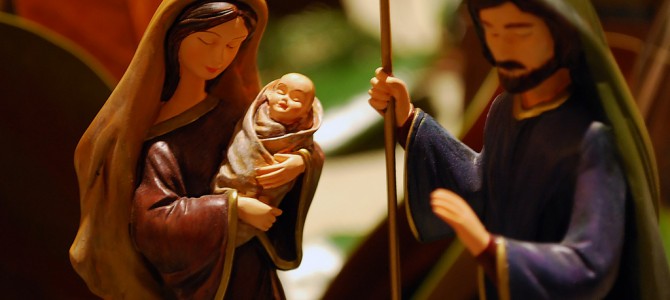
Sometimes people misunderstand the Bible because they don’t read Greek or Hebrew and can’t pick up on important concepts from the original languages that often get lost in translation. Sometimes people misunderstand the Bible because they don’t know the historical context that guides a proper interpretation of a given passage. And sometimes people misunderstand the Bible because they think that half-way remembering that one time in second grade when they put on a sheep costume and did something Bible-related is the same thing as reading the Bible.
This refusing to offer refuge to fleeing Syrians reminds me of a story, something about a pregnant couple and innkeepers w/ no room? Anyone?
Jill Filipovic (@JillFilipovic) November 17, 2015
Innkeeper turns away Levantine refugees, invites pregnant mother to stay in the barn with farm animals.
Blake Hounshell (@blakehounshell) November 16, 2015
Since governors across the nation began declaring that they will not accept Syrian refugees in their states following the terrorist attacks in Paris, many people have proudly outed themselves as members of that third category of bad Bible interpreters. Jill Filipovic, senior political writer for Cosmopolitan recently tweeted, “This refusing to offer refuge to fleeing Syrians reminds me of a story, something about a pregnant couple and innkeepers w/ no room? Anyone?” Media Matters for America research fellow Oliver Willis chirped in similarly with ” if only we had a seasonally appropriate story about Middle Eastern people seeking refuge being turned away by the heartless,” words that were retweeted eighteen thousand times. Similar sentiments popped up in meme form on Facebook and other social networking websites, implying that the heart of the Christmas story is a call for us to show hospitality to desperate foreigners, and that Christians who oppose the stateside settlement of severely desperate Syrian refugees have hilariously failed to learn the chief lesson of Christ’s nativity.
The problem with this “gotcha” observation, however, is that the Christmas story it describes is not the Christmas story described in the Bible. Rather, the notion that Joseph and Mary were locked out of every Best Western in Bethlehem comes from the standard Christmas pageant that many of us took part in during our youth. And the idea that the holy family was a group of refugees seeking shelter in a foreign land comes from, as best I can tell, a bunch of political liberals who haven’t gone to church since the aforementioned pageant and who apparently had so much cotton from the sheep costumes stuck in their ears during the show that they couldn’t hear half of the dialogue. Therefore, in order to give a bit of knowledge to those who have clearly never read the Scriptures but who think they’ve really stuck it to their hypocritical, Jesus-worshipping, yet Trump-supporting uncles, let’s smash a few non-Biblical Christmas myths.
1. Mary and Joseph were not foreigners in Bethlehem.
According to Luke 2:1-5, in the days prior to Christ’s birth, Caesar Augustus told all the people in the world who had to obey him that he wanted to count the number of people in the world who had to obey him. As checking in on your smart phone wouldn’t be invented for a couple millennia, the best way for people to be counted back then was for them to go to their hometowns. So why is it inaccurate to state that Joseph and Mary were foreigners when they arrived in Bethlehem? It was because, and follow my logic closely here, Joseph was from Bethlehem.
By taping a balloon to the belly of an eight year old girl with a somber, yet pious looking face, some Christmas pageants may have inadvertently given the impression that Mary and Joseph had to sludge through Mordor and a couple other countries in order to reach their destination, but the Biblical account of their journey simply tells us that Mary was pregnant with Christ when she traveled about seventy miles to her husband’s hometown that was in the same general Jewish terrain where everyone was descended from the same guy and where everyone spoke the same language and where everyone followed the same religion as they did back in Nazareth. So while being compared to the holy family is normally an honorable thing, in this case, it’s rather insulting to those Syrian refugees to say, “boy, being driven from your home and separated from your people and having to start over in a radically different and foreign land is just like the time when Joseph and Mary had to travel to his family’s place when she was pregnant.”
2. Mary and Joseph were not refugees.
While it’s true that refugees are people who, like Mary and Joseph, have moved from one geographical location to another at some point in their lives, those who merit the title “refugee” must also have changed geographical locations in order to flee a war, some form of natural disaster, or a political leader who is persecuting them. While Augustus’ decree of a census may certainly have inconvenienced Mary and Joseph, it didn’t rise to the level of persecution. Likewise, when they travelled to Bethlehem, Christ’s mother and earthly father weren’t fleeing from Caesar. They were obeying him. Therefore, to suggest that Mary, Joseph, and Jesus were persecution-fleeing refugees in Bethlehem is quite absurd, at least if one subscribes to the notion that you don’t get to change a word’s meaning just because doing so would make conservatives look like morons.
Perhaps the confusion on this point has come from people forgetting the sequence of events in that barely-remembered Christmas pageant and confusing the arrival in Bethlehem with the flight to Egypt. Certainly there are similarities between Syrians fleeing ISIS and Mary and Joseph seeking refuge in Egypt in order to save Jesus from the murderous wrath of King Herod. But I have no doubt that most conservative Christians in America would gladly be Egypt to those Syrians who are fleeing the Herodian bloodlust of ISIS, as long as they had absolute certainty that ISIS itself or an Islamist worldview wouldn’t cross the border with them.
3. Mary and Joseph were most likely not denied room at a hotel.
“You anti-immigration racists are being just as unwelcoming as the Bible’s Innkeeper #4, whom I so deftly portrayed at Friendship Community Bible Church back in 1991.” As far as I know, nobody has said this verbatim, but this is pretty much what I hear with every article, tweet, or post comparing the rejection of the Syrian masses to the rejection Joseph and Mary faced shortly before the birth of Christ. But take a look at the actual Bible and you won’t find Innkeeper #4. Or Innkeeper #3, 2, or 1. There are no innkeepers mentioned in Luke’s nativity account because, most likely, there was no inn.
The Greek word commonly rendered in English as “inn” in Luke 2 is the same word frequently translated as “guest room” in Luke 22, meaning that it was probably the guest quarters in a crowded family home where Mary could find no space for labor, requiring her to descend with Joseph into the lower part of the house where the animals were stored at night in order to give birth.
Admittedly, this explanation, found in greater detail here, is an enormous wet blanket slopped atop the hearts of Christians who have spent decades collecting barn-centric nativity scenes. But again, since Joseph and Mary were probably staying with his family members, it’s highly unlikely that they had any doors slammed in their face on the night when Christ was born, rendering the “you’re just as heartless as those hotel managers” accusation rather toothless. However, should any Christians who welcome pregnant Syrian refugees into their homes insist that those refugees deliver their children downstairs in the room where the dog likes to sleep and where the cat keeps peeing on the carpet, an accusation of religious hypocrisy would be most appropriate.
4. The Christmas story is not a morality tale about hospitality.
Plenty of passages in the Bible tell us how we should treat those affected by war. And plenty of Biblical narratives address how godly people have shared the mercy of Christ with those who didn’t share their faith or their tribe. But the Christmas story is something far deeper and more glorious than a morality tale about hospitality. The Christmas story is a proclamation that, out of His love for this world, God took on human flesh to dwell with us and to be our savior. The Christmas story is a promise that, when we warred against God, God brought us peace through the infant flesh of His Son, flesh that would one day be broken apart on the cross to give us eternal life. The nativity account is a declaration that, when we deserved condemnation for our sinful, inhospitable hearts, God welcomed us into His kingdom, His home, and His family by coming into our world at the birth of Jesus Christ.
Finding Christian answers to the Syrian refugee crisis is not easy. Certainly Christians must agree that we are called to love our neighbors as ourselves, but I believe that there’s room to debate how exactly that love should be manifested. We can disagree on whether bringing refugees into our nation is the most loving way to treat these neighbors, just as we can disagree on the most effective ways to keep both Americans and Syrians safe from ISIS attacks and Islamist violence. And, of course, when the angels proclaimed that the birth of Christ has brought peace to the earth, this should inspire all believers to find a way to share that peace with all those whose lives have been torn apart by the devil and his warfare.
But to say that the nativity account is a “story about Middle Eastern people seeking refuge being turned away by the heartless” is to reduce the miracle of the incarnation to an instruction manual on granting asylum, a reduction that’s not even partially justified by the words of St. Luke. It’s an ignorant, diminishing of a foundational doctrine of the Christian faith, something that doesn’t go unnoticed by those who, in addition to remembering the script of their second grade Christmas pageant, still managed to read one measly chapter of the Bible. And instead of revealing the heartlessness of conservatives, all this argument reveals is the ignorance and laziness of those who make it.









